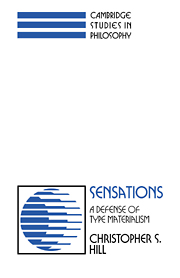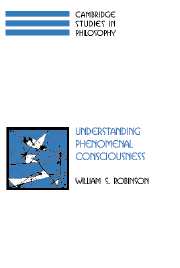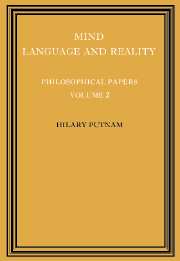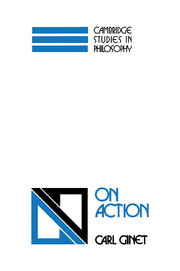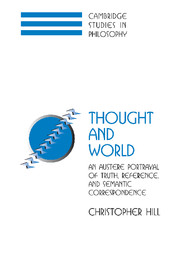Sensations
This is a book about sensory states and their apparent characteristics. It confronts a whole series of metaphysical and epistemological questions and presents an argument for type materialism: the view that sensory states are identical with the neural states with which they are correlated. According to type materialism, sensations are only possessed by human beings and members of related biological species; silicon-based androids cannot have sensations.
The author rebuts several other rival theories (dualism, double aspect theory, eliminative materialism, functionalism), and explores a number of important issues: the forms and limits of introspective awareness of sensations, the semantic properties of sensory concepts, knowledge of other minds, and unity of consciousness. The book is a significant contribution to the philosophy of mind, and has much to say to psychologists and cognitive scientists.
Reviews & endorsements
"This is a fine book, one of the most valuable in philosophy of mind in recent years. Hill persuasively advocates type-materialism about sensations and defends it effectively against well known objections, with incisive rebuttals of other positions. He proposes distinctive theses that deserve attention, e.g. about the structure of sensation-concepts, about what is special about visual sensations, about the unity of consciousness. Absolutely first rate." Brian Loar, University of Southern California
"The topic of this book belongs to what is usually thought of as the philosophy of mind, but it is very much the work of a metaphysician and logician. It is a pleasure to read a book in which an author who talks about 'functional roles' takes the trouble to say what ontological category these objects belong to and what individuates them. The thesis of this very closely reasoned and well-written book is that type-materialism is a viable theory, and in particular a viable alternative to functionalism. The book awakened me from what I imagine is a very common sort of dogmatic slumber: an unreflecttive acceptance of token materialism and functionalism." Peter van Inwagen, Syracuse University
"The topic of this book belongs to what is usually thought of as the philosophy of mind, but it is very much the work of a metaphysician and logician. It is a pleasure to read a book in which an author who talks about 'functional roles' takes the trouble to say what ontological category these objects belong to and what individuates them. The thesis of this very closely reasoned and well-written book is that type-materialism is a viable theory, and in particular a viable alternative to functionalism. The book awakened me from what I imagine is a very common sort of dogmatic slumber: an unreflecttive acceptance of token materialism and functionalism." Peter van Inwagen, Syracuse University
"The book is lucidly and elegantly written. It is full of crisply formulated, clear-headed, and provocative philosophical arguments...It is an important book, and should be essential reading for philosophers working on the issues it addresses." Terry Horgan, Memphis State University
"This is a fine book, one of the most valuable in philosophy of mind in recent years. Hill persuasively advocates type-materialism about sensations and defends it effectively against well known objections, with incisive rebuttals of other positions. He proposes distinctive theses that deserve attention, e.g. about the structure of sensation-concepts, about what is special about visual sensations, about the unity of consciousness. Absolutely first rate." Brian Loar, University of Southern California
Product details
January 1991Hardback
9780521394239
264 pages
225 × 150 × 22 mm
0.442kg
Available
Table of Contents
- Preface
- Part I. Introduction:
- 1. Topics and themes
- Part II. The Mind-Body Problem:
- 2. The failings of dualism and the double-aspect theory
- 3. The failings of functionalism
- 4. In defense of type materialism
- Part III. Introspection:
- 5. Introspective awareness of sensations
- 6. Introspection and the skeptic
- Part IV. Sensory Concepts:
- 7. Concepts of bodily sensations: Their semantic properties
- 8. Concepts of visual sensations: Their content and their deployment
- Part V. Other Minds:
- 9. Knowledge of other minds
- 10. Unity of consciousness, other minds, and phenomenal space
- Index.

